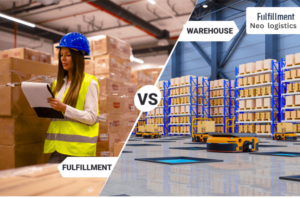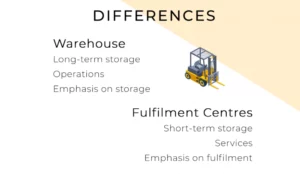People often use “fulfillment center” and “warehouse” as if they mean the same in terms of logistics and supply chain management, but there are big differences between the two.Understanding their functions, operations, and benefits is essential to be successful in business.
In this blog, we’re going to discuss both kinds of facilities, what services they offer, and when they’re used. Let’s dive in for more details!
What Is a Warehouse?
Warehouses are buildings or places made especially for storing goods and products for businesses. A warehouse serves as a central spot where stock can be kept until the supplier needs it. Warehouses typically accommodate various products ranging from small items to heavy machinery.
The main function of a warehouse is to offer a safe place to store inventory for businesses. Upon arrival, goods are organized, labeled, and placed on shelves or racks for easy access. Warehouses frequently use advanced systems to keep track of and manage stock levels efficiently.
Types Of Warehouses
Warehouses come in various types, catering to different industries and storage requirements. Some general kinds of warehouses include:
- Distribution Centers: These warehouses are placed strategically to help in distributing products to different retail spots or final customers. They serve as middle storage points in the supply chain.
- The other two types of warehouses are Public Warehouses and Private warehouses.
Advantages Of Using A Warehouse
There are several advantages to utilizing a warehouse for your storage needs:
- Bulk Storage: Warehouses provide ample space for businesses to store their inventory in bulk. This is especially helpful for companies that handle seasonal products or experience significant demand changes over the year.
- Cost Savings: By utilizing a warehouse, businesses can avoid the cost of maintaining their own storage facilities. This involves costs associated with renting the building, utilities, security, and equipment.
- Inventory Management: Warehouses often employ advanced inventory management systems that allow for accurate tracking of stock levels. This allows businesses to fine-tune their inventory, lessen stockouts, and enhance overall efficiency.
- Flexibility and Scalability: Warehouses offer flexibility in terms of storage capacity. As your business grows, you can easily expand your storage space within the warehouse or move to a larger facility, accommodating your changing needs.
What Is A Fulfillment Center?
A fulfillment center, also known as a fulfillment house or distribution center, is a specialized facility that focuses on order fulfillment and shipping processes. Fulfillment centers differ from warehouses by being designed to handle every stage of order fulfillment, from receiving customer orders to sending them out directly. Its main purpose is to smoothly manage the streamline operations
Moreover, fulfillment centers play an essential role in the e-commerce industry, where speed and efficiency are of the utmost importance. They act as a main hub for processing customer orders, selecting products for packaging, and overseeing shipment procedures.
Key Services Offered
- Inventory Management: Fulfillment centers employ sophisticated inventory management systems to keep track of stock levels, ensuring accurate and real-time inventory information.
- Order Processing: Fulfillment centers receive customer orders through various channels such as online marketplaces or e-commerce platforms like Shopify and Amazon and process them by selecting items from inventory and packing them ready for shipping.
- Packing and Labeling: Fulfillment centers employ staff with the expertise to pack and label orders according to individual customer requests. This includes adding branded packaging, product inserts, and shipping labels.
- Shipping and Logistics: Fulfillment centers often maintain relationships with shipping carriers and logistics providers to negotiate favorable shipping rates and ensure on-time delivery of orders.
- Returns Management: Fulfillment centers specialize in returns and exchanges management, streamlining the process for businesses while improving overall customer experiences.
Advantages of Utilizing a Fulfillment Center
Outsourcing order fulfillment to a specialized fulfillment center has many advantages:
- Efficiency: Fulfillment centers are designed to optimize the order fulfillment process, ensuring fast and accurate processing of customer orders. This results in enhanced customer contentment and recurring business.
- Cost Savings: By outsourcing fulfillment to a specialized center, businesses can save on labor costs, warehousing expenses, and shipping fees. Fulfillment centers benefit from economies of scale and have the ability to negotiate more favorable rates with shipping carriers.
- Scalability: Fulfillment centers offer scalability to accommodate the growth of your business. As order volumes increase, fulfillment centers can expand their operations, providing the necessary resources to handle higher order volumes.
- Focus on Core Competencies: By delegating order fulfillment services, companies can concentrate on their core competencies such as product development, marketing, and customer acquisition. This approach allows for heightened efficiency and specialization in crucial areas.
Fulfillment Center Vs. Warehouse: The Differences
Although fulfillment centers and warehouses share certain similarities, distinguishing features set them apart:
-
Duration Of Storage
Warehouses are designed for long-term storage of goods. Fulfillment centers act as a pivotal hub where businesses can securely store their inventory for prolonged durations until it is needed. On the other hand, fulfillment centers provide temporary storage for products that will soon be shipped out to customers. Fulfillment centers focus on quick turnaround times to ensure timely delivery of orders.
-
Goals
The goal of a warehouse is to focus on safe and long-term storage of inventory for months to a year. They hold a limited number of different items for an extended time. On the flip side, the goal of a fulfill center is to prioritize fast order processing. They don’t store inventory for long and are efficient in fulfilling orders. Bear in mind that, all fulfillment centers can serve as warehouse nut not all warehouses like fulfillment centers.
-
Order Fulfillment Process
While warehouses primarily handle the storage of inventory, fulfillment centers are responsible for the entire order fulfillment process. This includes receiving customer orders, picking and packing products, labeling shipments, and coordinating the shipping process. Fulfillment centers are equipped with specialized technology and trained personnel to efficiently process and fulfill orders.
-
Customer Experience
Fulfillment centers place a premium on enhancing customer experience by guaranteeing swift and precise order processing, along with timely delivery. They oversee every facet of the order fulfillment procedure, encompassing the management of returns and exchanges. Warehouses, on the other hand, do not have direct interactions with customers and primarily focus on providing secure storage space for goods.
Fulfillment Center vs. Warehouse: The Similarities
While fulfillment centers and warehouses serve different functions, there are several key similarities between them:
- Both fulfillment centers and warehouses provide storage space for businesses’ inventory. They are equipped with shelves, racks, and other storage systems to efficiently organize and store products. Both entities prioritize the safety and security of stored goods.
- Whether it’s small items, large machinery, perishable goods, or fragile items, both entities have the necessary infrastructure and processes to store and handle different types of inventory.
Case Studies: Real-Life Examples
To further illustrate the differences between fulfillment centers and warehouses, let’s explore two hypothetical case studies:
Company A: Warehouse Solution
Company A is a manufacturer of industrial machinery. They decided to lease a private warehouse to store their inventory.
The warehouse provides ample space for their machinery and allows them to maintain control over their storage and distribution process. While they handle order fulfillment internally, they may consider outsourcing this aspect in the future as their business grows.
Company B: Fulfillment Center Solution
Company B is an e-commerce retailer selling clothing and accessories. They encounter a substantial volume of orders daily and necessitate swift order processing and dispatching. To meet these demands, they partner with a fulfillment center.
The fulfillment center receives their customer orders, picks and packs the products, and coordinates the shipping process. This allows Company B to focus on marketing, product sourcing, and customer engagement, while the fulfillment center handles the logistics of order fulfillment.
Conclusion
Understanding the differences between fulfillment centers and warehouses is crucial for businesses seeking efficient storage and order fulfillment solutions. While both entities play important roles in the supply chain, they serve distinct purposes.
Warehouses provide long-term storage solutions with huge machinery like forklifts, containers or high stacked shelves for organized inventory while fulfillment centers specialize in order fulfillment processes – from receiving customer orders to shipping them out. By carefully considering your business’s needs, order volume, storage needs and growth potential you can make an informed decision as to whether a fulfillment center or warehouse would best meet those criteria.







